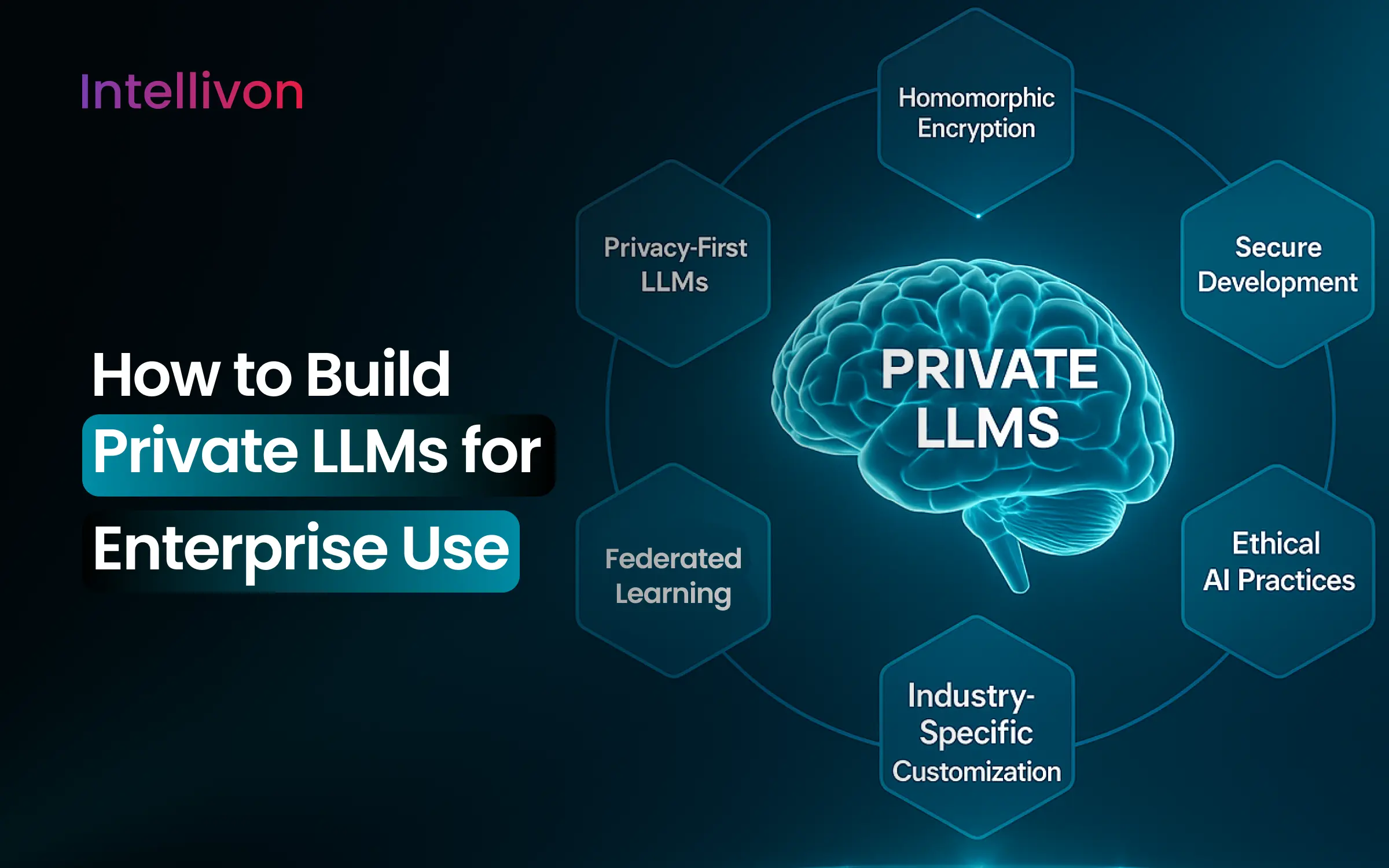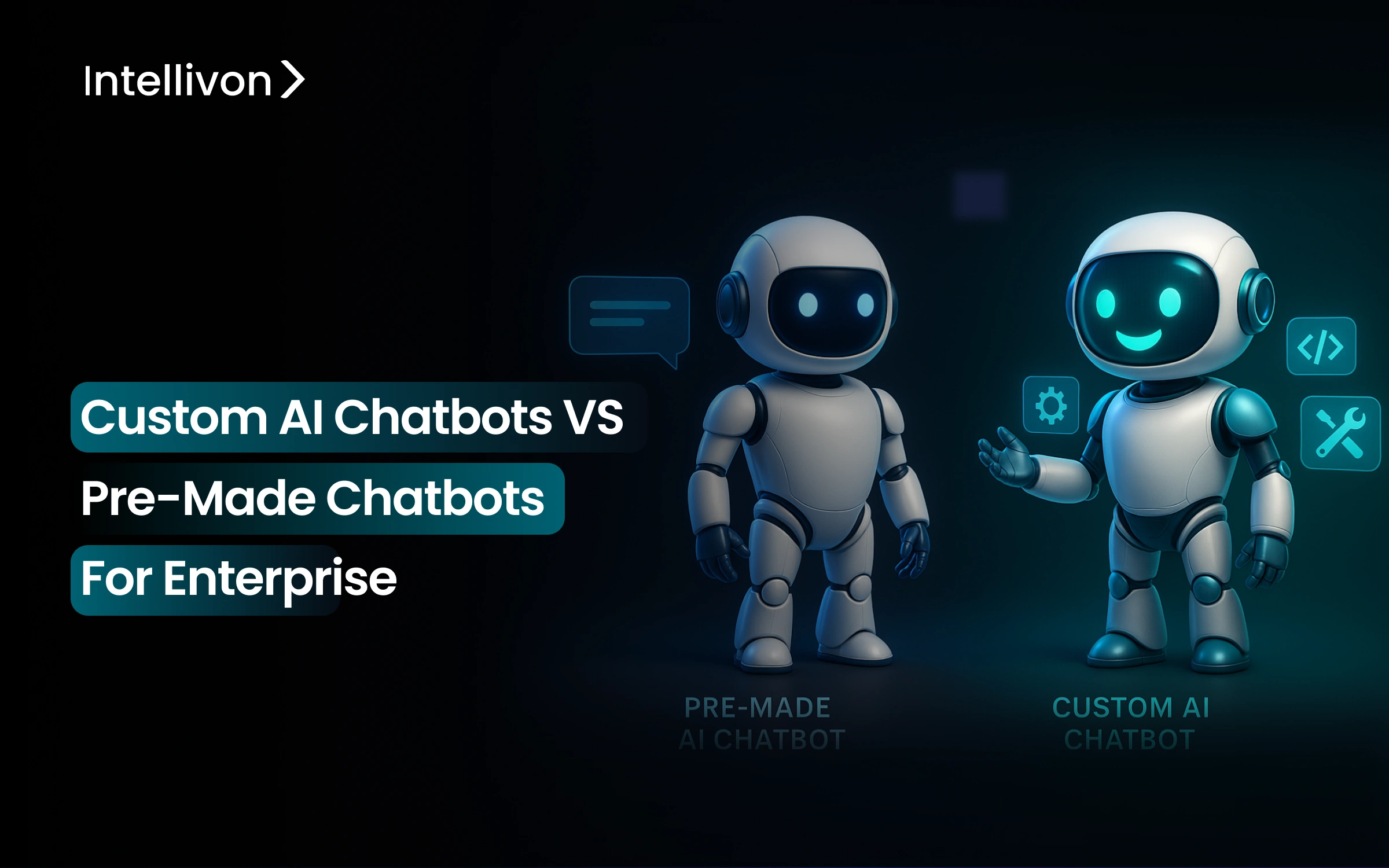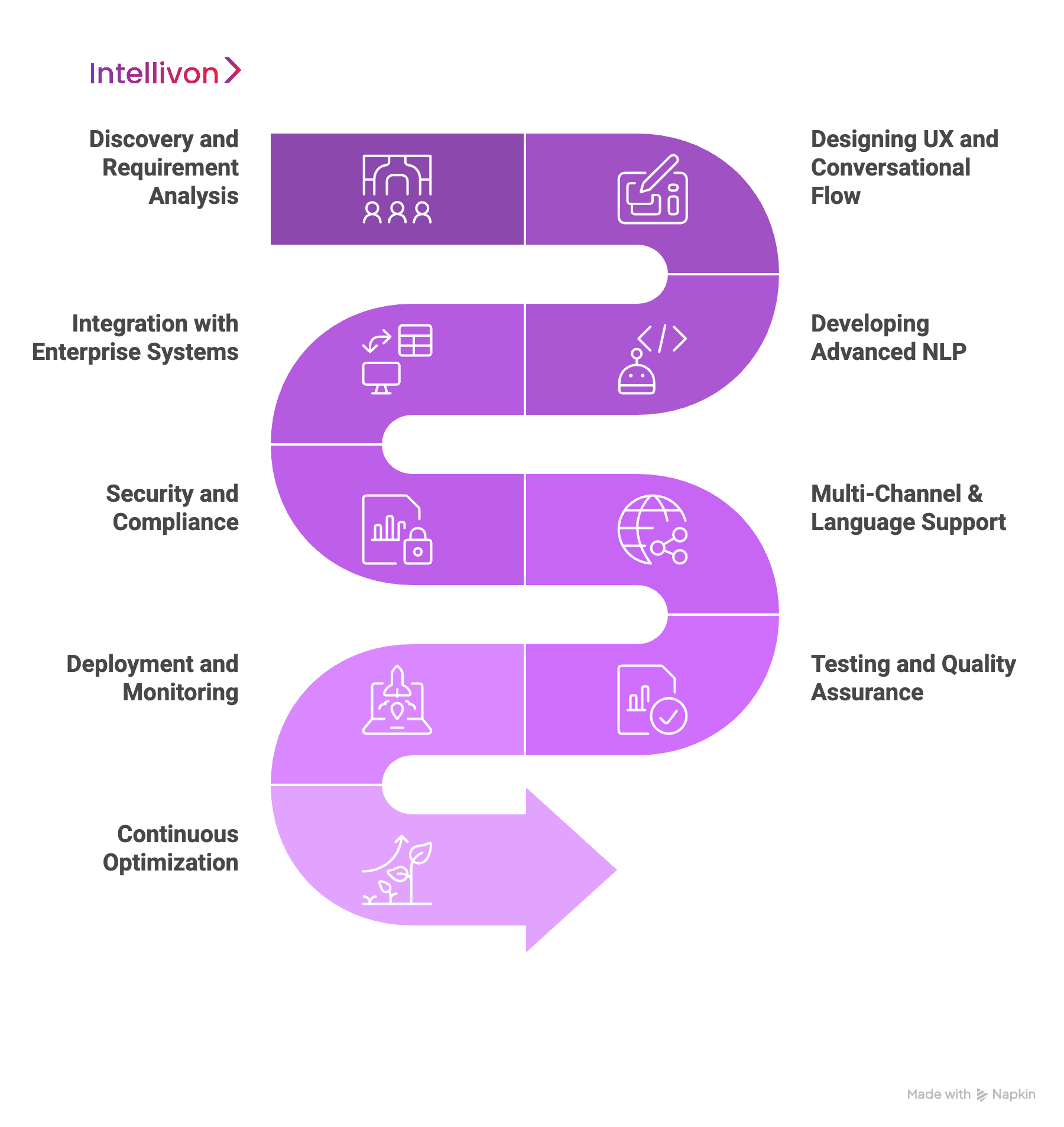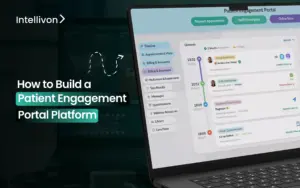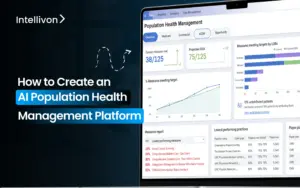As businesses grow and customer expectations rise, AI chatbots are becoming a must-have tool for improving efficiency and customer service. In fact, 80% of businesses plan to implement or expand their chatbot use by this year to boost engagement and ROI. But with so many options available, businesses face a dilemma: should they go with a pre-built chatbot or invest in a custom solution? While pre-built bots offer quick setup and cost efficiency, they often fall short when handling complex tasks and integrating with existing systems. The key is choosing a solution that scales with your business needs over time.
We’ve helped several enterprises build custom AI chatbot solutions that streamline workflows, enhance customer service, and drive efficiency. Intellivon’s expertise in developing AI-powered chatbots ensures that businesses can automate complex tasks, provide personalized customer experiences, and seamlessly integrate with existing systems. Our solutions not only improve customer engagement but also scale with your business as it grows. That’s why we’ve created this blog, to guide you to choose the right chatbot and help build a custom AI chatbot tailored to your enterprise’s unique needs, ensuring long-term success and operational excellence.
Key Market Takeaways of Enterprise AI Chatbots
According to a Grand View Research report, the global chatbot market size was valued at USD 7.76 billion in 2024 and is projected to reach USD 27.29 billion by 2030, growing at a CAGR of 23.3% from 2025 to 2030. A key driver in this market is the surge of AI and machine learning trends.
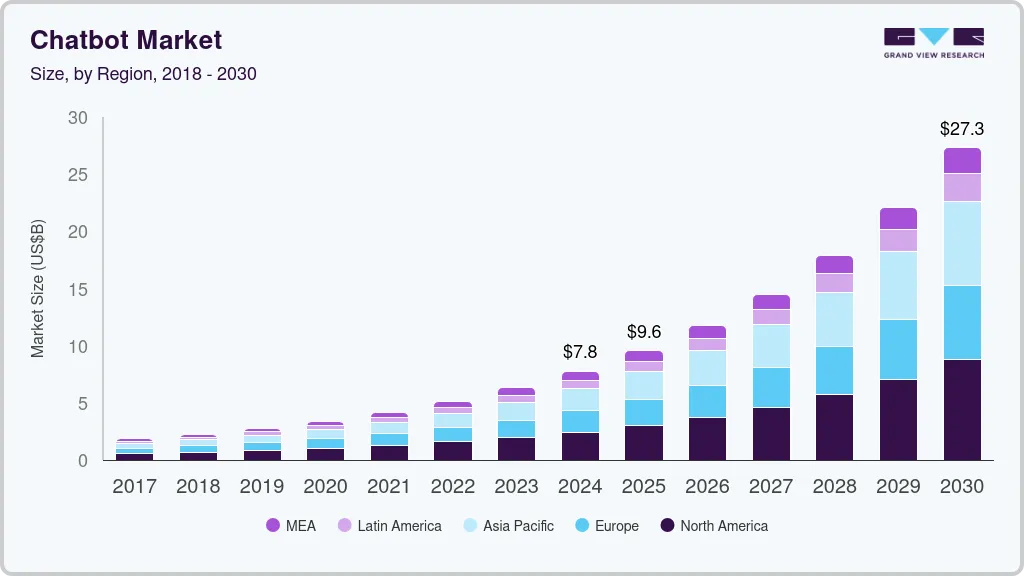
Key Market Takeaways:
- 88% of people had at least one conversation with a chatbot in the past year.
- 87% rate their chatbot interactions as neutral or positive.
- 62% would rather use a chatbot than wait for a human agent.
- 59% expect a chatbot reply within 5 seconds.
- 74% prefer chatbots for getting quick, simple answers.
- 80% of financial institutions see chatbots as a major opportunity.
- Healthcare: 68% of healthcare organizations now use AI chatbots.
- Global customer service cost savings: $11 billion annually by 2025 after using AI Chatbots.
- Average annual savings per company after using AI Chatbots: $300,000.
- Routine questions handled without humans: Up to 80%.
- By 2027, 25% of businesses will use chatbots as their main customer service tool.
As enterprises continue to embrace digital transformation, chatbots have become an essential tool for managing customer interactions at scale. However, as the market expands, businesses must consider their unique needs to choose the right chatbot solution, whether pre-built or custom, to ensure long-term success and scalability.
The Role of AI Chatbots in Enterprise Growth
AI chatbots play a multifaceted and crucial role in the growth of large enterprises. They have evolved into strategic assets that help businesses drive efficiency, strengthen customer relationships, and gather valuable business insights. Here are at least five key roles AI chatbots play in the growth of enterprises:
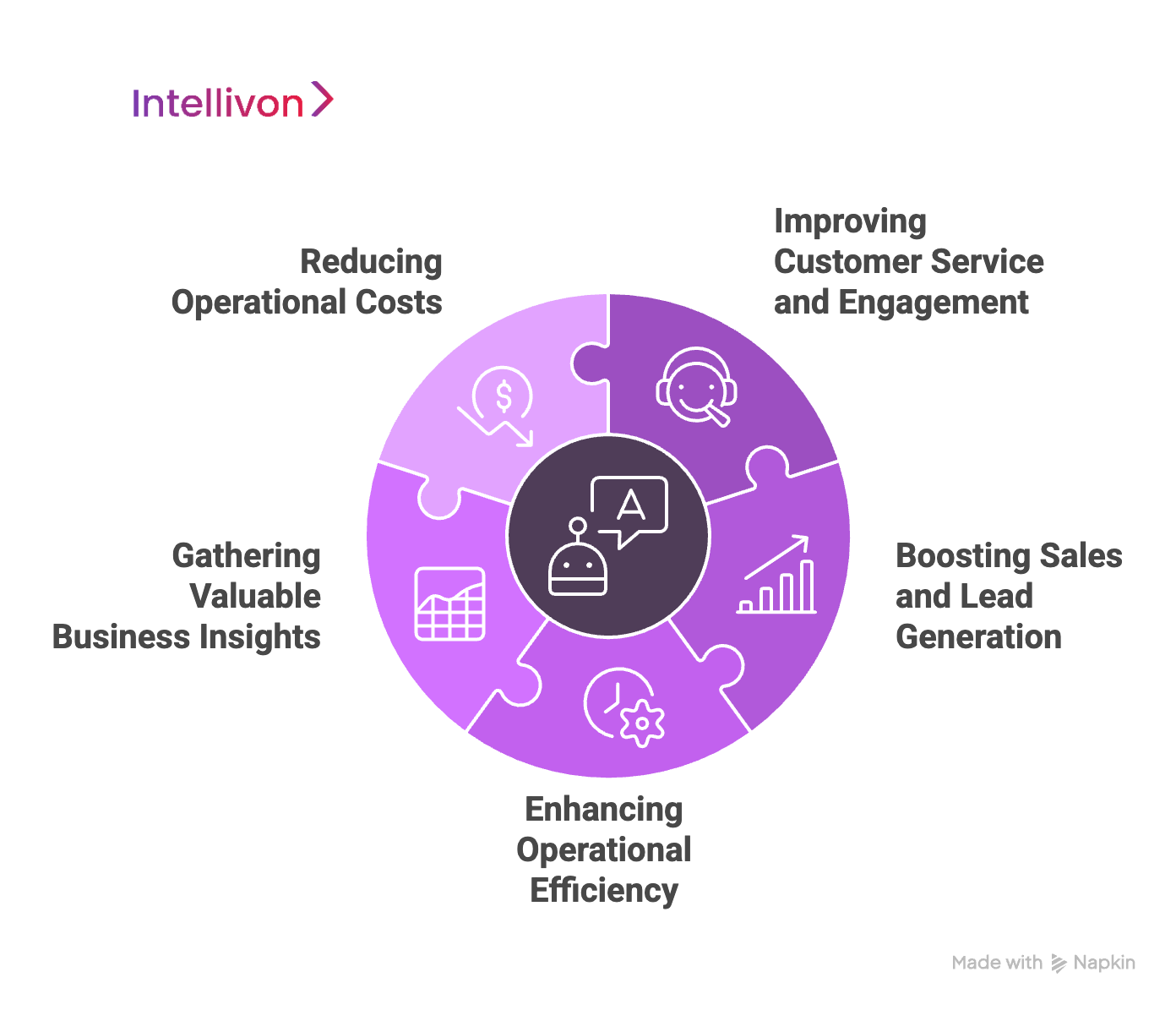
1. Improving Customer Service and Engagement
AI chatbots bring a fundamental shift in how enterprises handle customer service. According to a Zendesk report, 69% of customers prefer self-service over speaking with an agent, and chatbots can deliver just that by offering 24/7 availability. This ensures customers receive instant support and answers to common questions at any time, from anywhere. The immediate, round-the-clock access to assistance eliminates long wait times, offering a consistent, reliable point of contact.
By handling high volumes of routine inquiries, chatbots free up human agents to focus on more complex and high-value customer issues, ultimately improving service quality and increasing overall customer satisfaction. This shift not only enhances customer experience but also boosts brand loyalty.
2. Boosting Sales and Lead Generation
AI chatbots are a powerful tool for driving sales and enhancing lead generation. According to Statista, chatbots are expected to generate $142 billion in cost savings by 2024 across various industries, including sales and marketing.
Chatbots can engage proactively with website visitors, answer product-related questions, and offer personalized recommendations based on browsing history. More importantly, they play a critical role in qualifying leads by asking targeted questions to assess potential customers’ needs before seamlessly passing them off to human sales representatives. This automation shortens the sales cycle, improves lead conversion rates, and ultimately contributes to higher revenue.
3. Enhancing Operational Efficiency
For large enterprises, maintaining operational efficiency is crucial to staying ahead in a competitive market. AI chatbots can streamline many internal processes by providing employees with quick and easy access to information.
For instance, in HR departments, chatbots can answer frequently asked questions about company policies, benefits, or leave requests, while in IT departments, they can assist with password resets or troubleshoot technical issues. By automating these tasks, chatbots reduce the workload on internal support teams, leading to higher productivity and faster decision-making. According to a PwC survey, 34% of businesses have already seen improved operational efficiency by integrating AI chatbots into their workflows.
4. Gathering Valuable Business Insights
Every interaction an AI chatbot has is a potential source of data that can help shape business strategies. AI chatbots are designed to collect and analyze conversational data, offering enterprises valuable insights into customer behavior, pain points, feedback, and emerging trends.
For example, Customer Support chatbots can track recurring issues, while Sales chatbots gather insights into what customers are asking or interested in. Analyzing sentiment and content helps businesses fine-tune products, marketing strategies, and operational processes.
5. Reducing Operational Costs
The adoption of AI chatbots can significantly reduce operational costs for large enterprises. By automating routine tasks in customer service, HR, and IT support, businesses can cut down on the need for extensive human resources in these areas.
This is especially important for providing 24/7 support, which would otherwise require expensive after-hours staffing. The cost savings from reduced labor needs, combined with improved productivity, lead to a strong return on investment (ROI). According to a Juniper Research study, chatbots are expected to reduce business costs by over $8 billion annually by 2022 through the automation of customer service tasks alone.
These key roles show how AI chatbots are transforming enterprises by making operations more efficient, enhancing customer engagement, and driving cost savings. Their ability to scale with growing business needs and their potential to gather valuable insights make them indispensable tools for large enterprises looking to thrive in an increasingly competitive landscape.
Custom AI Chatbots vs Pre-Made Chatbots: A Comparison
When deciding between custom AI chatbots and pre-made chatbots, it’s important to weigh the pros and cons of each option. While pre-made chatbots may be a tempting choice for quick deployment, custom AI chatbots offer superior flexibility, scalability, and personalization. Let’s take a closer look at the strengths and weaknesses of both options.
Custom AI Chatbots
Pros
1. Tailored to Business Needs
Custom AI chatbots are designed specifically for your enterprise, meaning they can be fully aligned with your unique processes, workflows, and customer needs. Whether it’s specialized product knowledge or complex troubleshooting, a custom solution provides better results.
2. Scalability
As your business grows, a custom AI chatbot can scale to handle increased traffic and more complex tasks. These bots are built to grow with your business, making them a long-term solution.
3. Advanced Capabilities
Custom chatbots can leverage the latest technologies like Natural Language Processing (NLP) and Machine Learning (ML) to handle sophisticated customer interactions. They can learn over time and improve their responses, leading to better customer experiences.
4. Integration with Existing Systems
Custom AI chatbots can seamlessly integrate with your existing systems (CRM, ERP, payment systems, etc.). This ensures that your chatbot can access the data it needs to provide accurate and relevant responses, increasing efficiency and automation.
5. Enhanced Personalization
With a custom AI chatbot, you can deliver a highly personalized customer experience, tailoring responses based on user preferences, behaviors, and past interactions.
Cons:
1. Higher Initial Cost
Developing a custom AI chatbot requires more investment upfront. This includes costs for development, testing, and deployment, which can be higher than a pre-made solution.
2. Longer Time to Deploy
Custom solutions take longer to develop and implement. The process of tailoring a chatbot to your business’s needs and integrating it with existing systems takes time, which might not be ideal for businesses needing a quick fix.
3. Ongoing Maintenance
Custom chatbots require ongoing maintenance and updates to ensure they stay effective as your business evolves. This adds to long-term costs, though the benefits often outweigh these expenses.
Pre-Made Chatbots
Pros:
1. Quick Deployment
Pre-made chatbots are ready to use almost immediately. With little setup required, you can deploy them quickly to start handling basic tasks like answering FAQs or managing appointments.
2. Cost-Effective
Generally, pre-made chatbots are cheaper to set up. They offer an affordable solution for businesses that need something simple without a heavy investment.
3. Ease of Use
Pre-made chatbots are designed to be user-friendly. They typically come with drag-and-drop interfaces, so even non-technical users can set them up and manage them with minimal effort.
Cons:
1. Limited Customization
Pre-made chatbots are built with a one-size-fits-all approach, meaning they may not meet the specific needs of a large enterprise. They’re limited in their ability to adapt to complex workflows or advanced automation needs.
2. Scalability Issues
As your business grows, a pre-made chatbot might not be able to keep up with the increased volume of interactions or the need for more sophisticated tasks. This can lead to performance issues or limitations in customer service.
3. Poor Integration
Pre-made chatbots often struggle to integrate seamlessly with your existing systems. This can result in missed opportunities to automate processes and deliver more personalized customer experiences.
4. Less Advanced Capabilities
While pre-made chatbots may handle basic inquiries well, they typically lack the advanced AI capabilities like NLP or ML that a custom solution can offer. This makes them less effective at managing more complex customer interactions.
Comparison Table
| Feature | Custom AI Chatbot | Pre-Made Chatbot |
| Customization | Fully tailored to business needs | Limited customization |
| Scalability | Easily scalable as the business grows | May struggle with scaling |
| Integration | Seamless integration with existing systems | Difficult to integrate with complex systems |
| Advanced Features | NLP, machine learning, and advanced features | Basic automation and task handling |
| Cost | Higher initial cost, but long-term value | Lower upfront cost |
| Deployment Time | Longer deployment time | Quick deployment |
| Ongoing Maintenance | Ongoing maintenance and updates | Minimal maintenance required |
| Personalization | High level of personalization | Limited personalization |
While pre-made chatbots might be appealing due to their lower initial cost and faster deployment, they often fall short when it comes to meeting the unique needs of large enterprises.
Custom AI chatbots, though more expensive and requiring more time to develop, provide unparalleled flexibility, scalability, and integration capabilities that make them a better long-term investment for businesses looking to enhance customer experience and optimize operations.
Key Factors to Consider Before Choosing AI Chatbot for Enterprise
When deciding which AI chatbot solution is best for your enterprise, it’s important to assess several factors to ensure that you choose the right fit for your business needs. Whether you’re considering a custom AI chatbot or a pre-made solution, these key factors can help guide your decision-making process.
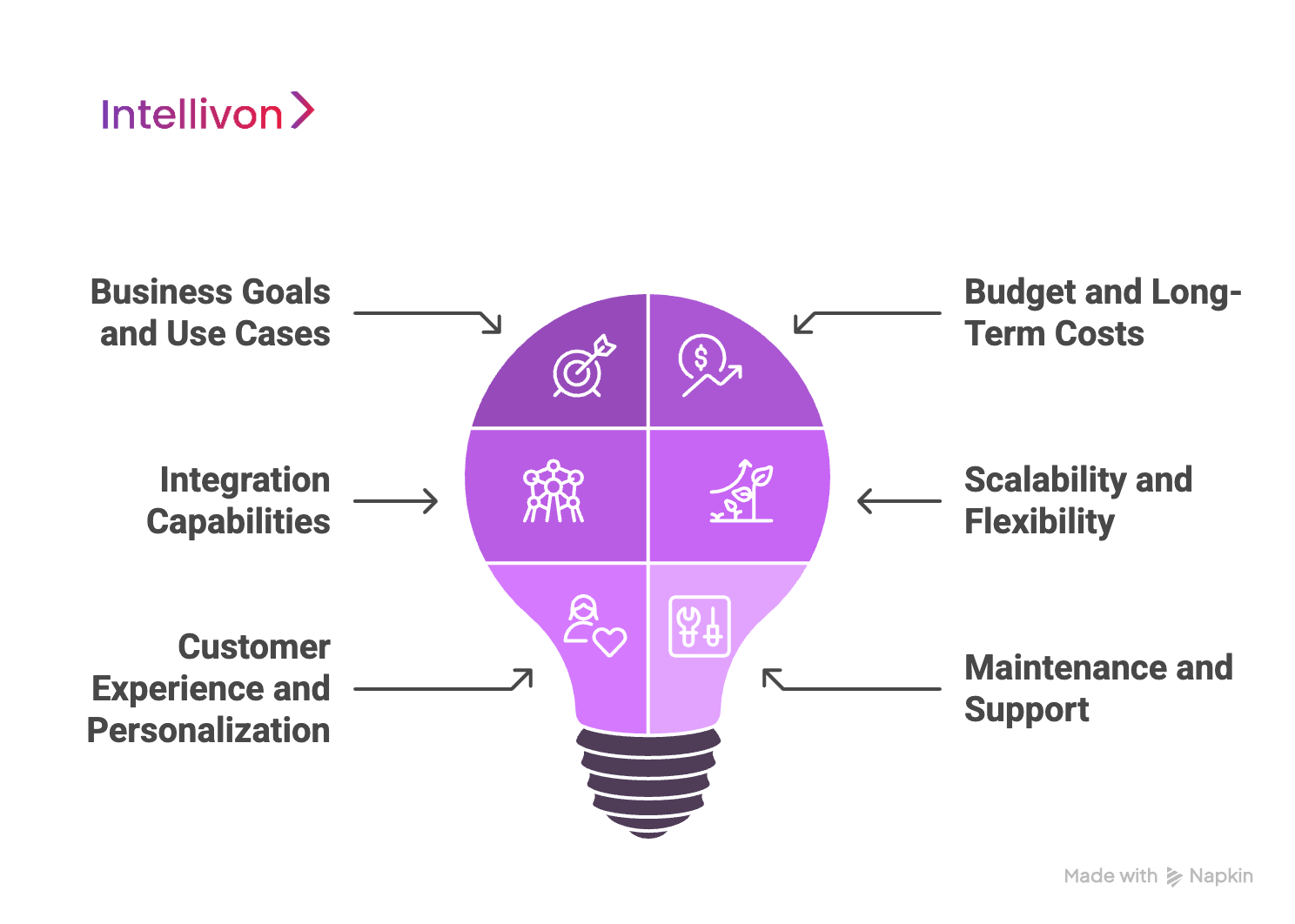
1. Business Goals and Use Cases
The first step in choosing the right chatbot is understanding what you need it to do. Are you looking for a solution that handles simple tasks, like answering frequently asked questions or scheduling appointments? Or do you need a more advanced chatbot that can manage complex customer service queries, troubleshoot issues, and integrate with other systems?
- Simple Use Case: Pre-made chatbots may be sufficient if your needs are basic. These bots excel at handling straightforward, repetitive tasks.
- Complex Use Case: If your business requires more advanced automation, personalized responses, or integrations with existing systems, a custom AI chatbot is a better fit.
2. Budget and Long-Term Costs
Cost is always a major consideration, but it’s important to think beyond the initial price. While pre-made chatbots may have a lower upfront cost, they often require ongoing maintenance, add-on fees for premium features, or subscription plans for scalability.
Custom AI chatbots, on the other hand, have a higher initial cost but can provide a better ROI over time. Custom AI chatbots deliver 140% ROI in the first year alone compared to off-the-shelf solutions. These bots are built to scale and can be adjusted to meet your enterprise’s evolving needs, minimizing the need for costly upgrades down the line.
3. Integration Capabilities
Your chatbot needs to work seamlessly with your existing systems. Whether it’s a CRM, payment system, or email marketing tool, integration is key to improving efficiency.
- Pre-Made Chatbots: Often come with basic integrations but may lack the ability to fully connect with complex, enterprise-level software systems.
- Custom AI Chatbots: Designed with your specific systems in mind, ensuring smooth integration and enabling automation across all your tools.
Choosing a chatbot that can integrate with your other business tools will streamline processes and enhance overall productivity.
4. Scalability and Flexibility
As your enterprise grows, so should your chatbot. Pre-made chatbots are typically suited for small to medium-sized businesses and may struggle to handle high volumes of interactions or more complex use cases.
Built with scalability in mind, custom chatbots can grow alongside your business and evolve to meet new challenges and demands. They can easily handle a larger volume of customers and adapt to more complex workflows.
Scalability is especially important for enterprises that expect rapid growth or operate in industries with constantly changing needs.
5. Customer Experience and Personalization
A chatbot should enhance the customer experience, not hinder it. The level of personalization your chatbot can offer plays a critical role in this.
- Pre-Made Chatbots: Generally limited in customization, making them less effective at offering a personalized, seamless customer experience.
- Custom AI Chatbots: Capable of offering highly tailored interactions. With a custom solution, you can ensure that your chatbot reflects your brand’s voice, adapts to user preferences, and provides accurate, relevant responses.
Providing a personalized experience helps build trust and loyalty, improving customer satisfaction and retention.
6. Maintenance and Support
All chatbots require ongoing maintenance and support, but the level of service can vary.
- Pre-Made Chatbots: Support is often limited to email or community forums, with additional fees for higher-level support.
- Custom AI Chatbots: Offer comprehensive support, with many companies providing 24/7 service, dedicated account managers, and ongoing updates to ensure your chatbot runs smoothly and stays up to date.
Ensure that you have reliable support for troubleshooting, updates, and improvements, especially if your chatbot plays a key role in customer service or internal operations.
While pre-made chatbots may be sufficient for basic tasks, custom AI chatbots offer a more flexible, scalable, and personalized solution that grows with your enterprise. By evaluating these key factors, you can make a more informed decision and choose the chatbot that best aligns with your business’s unique requirements.
Real World Use Cases of Enterprises Using Custom AI Chatbots
AI chatbots are revolutionizing various industries by offering businesses the tools they need to automate tasks, improve efficiency, and enhance customer experience. Here are some real-world use cases where enterprises are leveraging custom AI chatbots to transform their operations.
1. Healthcare
1. Appointment Scheduling & Management
AI chatbots are transforming how healthcare providers manage appointments. By integrating with Electronic Health Records (EHR) or Electronic Medical Records (EMR) systems, chatbots automate booking, reminders, and rescheduling. This reduces administrative overhead and ensures patients never miss an appointment.
2. Symptom Checking & Triage
AI-powered chatbots can assess patient symptoms, recommend next steps, or connect patients with the appropriate specialist. By quickly analyzing data, they help healthcare professionals prioritize cases, improving response times and patient care.
3. Medication Reminders & Management
Managing medication schedules is essential for patient health. AI chatbots send automated reminders for dosage, refills, and follow-up appointments, ensuring patients stay on track with their treatment plans, ultimately enhancing treatment adherence.
4. Post-Discharge Follow-up & Remote Monitoring
After patients leave the hospital, AI chatbots continue to play a role in tracking their recovery. By monitoring progress and alerting healthcare providers to critical situations, chatbots can facilitate quicker interventions and improve post-care support.
Real-World Example: Babylon Health
Babylon Health is an example of an AI chatbot in the healthcare industry that helps millions of people manage their health. Their chatbot uses advanced AI to assess symptoms, offer medical advice, and even connect patients with healthcare professionals when needed.
2. Financial Services / Banking
1. Personalized Financial Advice
In banking and finance, AI chatbots offer tailored investment or savings recommendations based on real-time customer data. They can analyze spending patterns, suggest budgeting strategies, and recommend financial products that suit individual needs, making financial advice more accessible.
2. Fraud Detection & Alerts
Security is paramount in financial services. AI chatbots monitor account activity in real-time, detecting anomalies and engaging customers to verify suspicious transactions. This proactive approach enhances fraud prevention while offering customers peace of mind.
3. Loan & Credit Application Assistance
Navigating loan or credit applications can be overwhelming for many. Custom chatbots guide users step-by-step through the process, ensuring all necessary information is provided while also ensuring compliance with financial regulations. This results in a smoother, faster application process.
4. Regulatory & Compliance Support
Financial institutions are constantly under pressure to comply with complex regulations. AI chatbots can provide instant answers to compliance-related questions, helping both customers and internal teams avoid costly mistakes and reduce regulatory risk.
Real-World Example: Bank of America’s Erica
Bank of America’s AI chatbot, Erica, provides personalized financial assistance by helping customers manage their bank accounts, track spending, and even offering insights into saving and investing. Erica’s ability to understand customer behavior and provide timely financial advice has significantly enhanced the bank’s customer experience, resulting in higher engagement and satisfaction.
3. Real Estate
1. 24/7 Property Inquiry Response
Real estate agents often struggle to respond quickly to property inquiries. Custom AI chatbots handle inquiries round-the-clock, providing instant answers and even offering rich media like property videos, floor plans, and virtual reality tours. This enhances engagement and helps clients make quicker decisions.
2. Lead Qualification & Nurturing
AI chatbots automatically engage potential buyers, qualifying leads based on budget, location preferences, and other factors. By prioritizing hot leads, chatbots ensure real estate agents spend their time with the most promising prospects, improving conversion rates.
3. Appointment & Site Visit Scheduling
Scheduling property viewings can be time-consuming. AI chatbots automate this process by syncing with brokers’ calendars and managing appointments for clients, ensuring a smooth and efficient process for both agents and buyers.
4. Mortgage & Financing Pre-Qualification
For prospective buyers, chatbots assist with initial financial assessments, guiding users through pre-qualification for mortgages or loans. They can connect customers with suitable lenders, streamlining the financing process.
Real-World Example: Zillow’s Chatbot
Zillow, a leading online real estate marketplace, uses a chatbot to assist homebuyers and renters with property searches and scheduling viewings. The chatbot engages users by answering their questions, providing personalized property suggestions, and scheduling tours, all while keeping track of their preferences.
4. Travel & Hospitality
1. End-to-End Booking Assistance
Travel planning can be overwhelming, but AI chatbots simplify the process by managing bookings for flights, hotels, car rentals, and activities. With everything available in one conversation flow, customers can easily plan their entire trip through the chatbot, enhancing the customer experience.
2. Real-Time Travel Updates
Travelers rely on timely updates. Custom AI chatbots send real-time notifications regarding flight delays, gate changes, or booking modifications, ensuring travelers are always in the loop and reducing stress during their journeys.
3. Personalized Itinerary Planning
AI chatbots offer personalized recommendations based on traveler preferences and past trips. Whether it’s suggesting restaurants, activities, or hidden gems, these chatbots create personalized itineraries that enhance the travel experience.
4. Loyalty Program Management
Customers can easily access and manage their loyalty programs through AI chatbots. From checking point balances to redeeming offers and receiving exclusive promotions, the chatbot provides seamless access to loyalty rewards and enhances customer retention.
Real-World Example: KLM Royal Dutch Airlines’ BlueBot
KLM’s BlueBot is an AI-powered chatbot that helps customers with everything from booking flights to providing real-time travel updates. It can assist with checking flight status, managing bookings, and providing flight options based on the user’s preferences.
5. E-commerce & Retail
1. Guided Product Discovery
Finding the right product can be a challenge for online shoppers. AI chatbots simplify product discovery by offering personalized recommendations based on user behavior and preferences. This increases conversion rates and improves the shopping experience.
2. Cart Abandonment Recovery
Shopping cart abandonment is a major issue for e-commerce businesses. AI chatbots engage users who leave items in their carts by offering special promotions, sending reminders, or creating a sense of urgency. This proactive approach helps recover lost sales.
3. Order Tracking & Post-Purchase Support
After a purchase, customers often want to track their orders. AI chatbots provide real-time shipment updates and assist with post-purchase support, such as easy returns or exchanges, ensuring a smooth post-purchase experience.
4. Personalized Marketing & Upselling
AI chatbots can send targeted promotions based on a user’s purchase history or browsing behavior. By suggesting complementary products or offering discounts, chatbots drive upselling and enhance customer satisfaction with tailored offers.
Real-World Example: H&M’s AI Chatbot
H&M’s chatbot offers an intuitive shopping experience by helping customers find the perfect clothing items based on style preferences, size, and budget. It also helps with order tracking and provides personalized product suggestions. The chatbot has helped H&M enhance its online sales and engagement, making the shopping process quicker, easier, and more enjoyable for customers, driving both conversions and customer satisfaction.
AI chatbots have become essential tools for enterprises across industries. Whether in healthcare, finance, real estate, travel, or e-commerce, custom AI chatbots streamline operations, automate repetitive tasks, and enhance customer engagement.
Essential Features Of Our Enterprise AI Chatbots
When building a custom AI chatbot for large-scale enterprises, it’s crucial that the solution is more than just a conversational tool. It must be a strategic asset designed to provide performance, security, and scalability. Here are the key features we ensure are integrated into every enterprise AI chatbot we build.
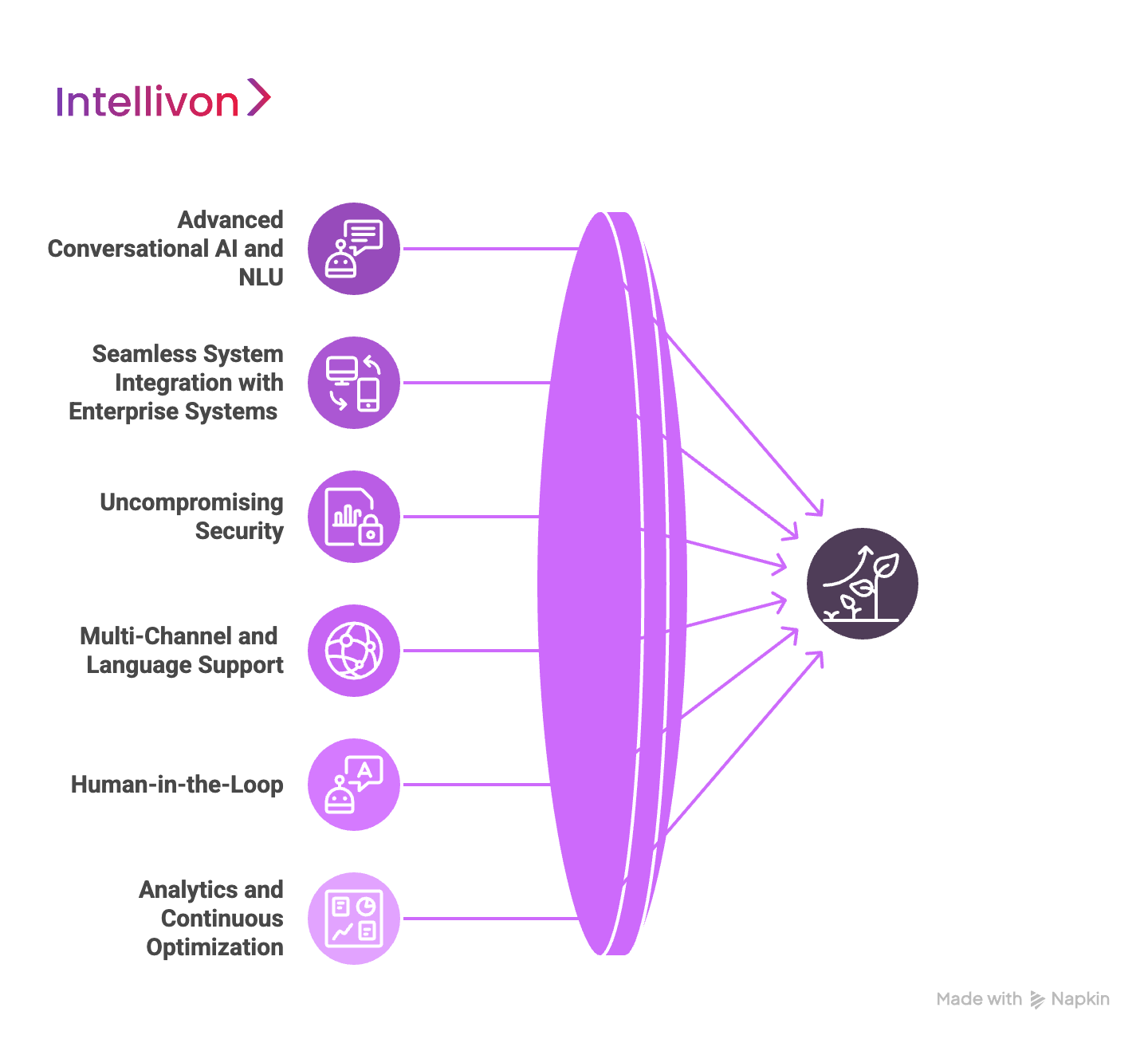
1. Advanced Conversational AI and NLU
The core strength of any effective AI chatbot lies in its ability to understand the context, intent, and sentiment behind user interactions. Our custom chatbots go beyond basic keyword matching to manage complex, multi-turn conversations. They are equipped with Natural Language Understanding (NLU), allowing them to interpret industry-specific terminology, jargon, and acronyms.
This results in a chatbot that feels smart and intuitive, providing users with a smoother, more engaging experience. By understanding the nuances of conversations, our AI chatbots ensure your customers or employees receive relevant, accurate responses every time.
2. Seamless Integration with Enterprise Systems
A key advantage of custom-built chatbots is their ability to integrate with your existing technology stack. Our chatbots are designed to connect with your CRM, ERP, and other critical systems, allowing them to pull real-time data and provide personalized responses.
By automating workflows and delivering seamless data exchange between platforms, our chatbots help reduce manual processes, saving time and improving operational efficiency. This deep integration ensures the chatbot becomes an integral part of your enterprise ecosystem, providing real value and minimizing the friction of switching between tools.
3. Uncompromising Security
For enterprises handling sensitive data, security cannot be an afterthought. Our chatbots are built with enterprise-grade security from the ground up. We ensure they adhere to industry-leading standards like GDPR, HIPAA, and SOC 2 compliance.
This means that your organization can trust our chatbots to handle personal and confidential information securely. Whether you’re managing customer data, financial details, or employee records, our chatbots provide complete control over your data, ensuring privacy, security, and compliance every step of the way.
4. Multi-Channel and Language Support
In today’s globalized world, your chatbot needs to be accessible everywhere. Our custom chatbots are designed to operate across multiple platforms like websites, mobile apps, and messaging tools like Slack and Microsoft Teams.
Moreover, to cater to diverse international audiences, our chatbots support multiple languages, ensuring that users across different regions have a consistent and localized experience. Whether your customers are in the U.S., Europe, or Asia, they’ll be able to interact with your chatbot in their preferred language and platform.
5. Human-in-the-Loop
While chatbots can handle a lot of tasks, there are moments when human intervention is needed. Our custom chatbots come with a smart handoff mechanism that recognizes when a query is too complex or sensitive.
When needed, the chatbot can seamlessly transfer the conversation to a live agent, making sure the agent has access to the full chat history. This ensures that users don’t have to repeat themselves and that the human agent is fully prepared to provide a solution. It strikes the perfect balance between automation and human support.
6. Analytics and Continuous Optimization
Data is at the heart of improving chatbot performance. Our chatbots come equipped with analytics dashboards that track key metrics such as user engagement, success rates, and frequently asked questions.
This data allows you to see how well your chatbot is performing and identify areas for improvement. As your chatbot gathers more interactions, we use this information to optimize and enhance its responses over time. Continuous optimization ensures that your chatbot becomes more effective, delivering better outcomes for your business.
Intellivon’s custom AI chatbots are built to scale with your business, helping you improve service quality, streamline operations, and achieve better business outcomes. By leveraging advanced conversational AI, NLU, and deep system integration, we help businesses stay ahead of the curve in today’s fast-paced digital world.
How We Build Custom AI Chatbots for Enterprises: Step-By-Step Process
At Intellivon, we specialize in building custom AI chatbots designed specifically for enterprise-level needs. Our process is thorough and structured, ensuring that every chatbot we develop is secure, scalable, and efficient. Here’s how we build AI chatbots that drive business success:
1. Discovery and Requirement Analysis
The first step in building a custom enterprise AI chatbot is to fully understand your business. We work closely with key stakeholders to define the chatbot’s objectives, identify core use cases, and analyze your existing systems (like CRM, ERP, or other tools). This step ensures we create a solution that aligns with your business’s unique needs and goals, setting a strong foundation for the entire project.
2. Designing UX and Conversational Flow
Once we understand your business, we focus on designing the user experience (UX) and conversational flow. We create an intuitive, engaging interface, ensuring that interactions with the chatbot feel natural and seamless.
The chatbot’s ability to handle both simple and complex user requests is carefully crafted, ensuring a frictionless experience that reduces customer effort and increases satisfaction.
3. Developing Advanced NLP
The next step is to implement NLP, a key component for intelligent conversations. At Intellivon, we develop advanced NLP algorithms that go beyond basic keyword matching.
Our chatbots understand user intent, context, and sentiment, enabling them to manage multi-turn conversations and interpret industry-specific terms accurately. This ensures that the chatbot can handle complex queries, a critical feature for enterprise use.
4. Integration with Enterprise Systems
A custom chatbot’s true value comes from its ability to integrate seamlessly with existing enterprise systems. We ensure our chatbots are deeply integrated with your CRM, ERP, and other business tools.
This allows the chatbot to pull and update real-time data, enabling personalized interactions and automated workflows. Seamless integration is key to ensuring the chatbot operates smoothly across your entire organization.
5. Security and Compliance
At Intellivon, we prioritize security and data sovereignty. Our custom chatbots are built with enterprise-grade security protocols from the ground up, ensuring compliance with relevant standards like GDPR, HIPAA, and SOC 2.
We provide complete control over your data, ensuring its security, privacy, and compliance with industry regulations.
6. Multi-Channel & Language Support
To reach a diverse, global audience, our chatbots are designed to operate across multiple communication channels, including websites, mobile apps, and messaging platforms like Slack or Microsoft Teams. Additionally, our solutions support multiple languages, allowing enterprises to deliver a consistent experience to users across different regions and languages, improving global engagement.
7. Testing and Quality Assurance
Before deployment, we rigorously test the chatbot to ensure it meets all performance standards. Our team conducts thorough user acceptance testing (UAT), stress tests, and security audits to ensure the chatbot operates reliably at scale. We also make adjustments based on feedback to guarantee optimal performance, ensuring that the chatbot performs under real-world conditions.
8. Deployment and Monitoring
Once the chatbot is tested and approved, we deploy it across your chosen platforms. Post-deployment, Intellivon provides continuous monitoring to track KPIs, such as user engagement and conversation success rates. We ensure that the chatbot is performing as expected and meeting business objectives.
9. Continuous Optimization
Our work doesn’t stop after deployment. We continuously optimize the chatbot’s performance based on real-time analytics and user feedback. Through ongoing updates and machine learning tuning, the chatbot evolves to better serve your business needs. This ensures that the chatbot remains effective and aligned with your company’s evolving goals.
We follow a comprehensive, enterprise-focused approach to chatbot development. From the initial discovery phase to continuous optimization, our team ensures that your custom AI chatbot is a strategic asset designed to meet the specific needs of your business.
Cost of Building a Custom AI Chatbot for Your Enterprise
This cost sheet covers the comprehensive stages of developing and deploying a custom AI chatbot, from initial planning through continuous optimization. The final cost will depend on factors like features, integration complexity, and maintenance needs.
| Cost Component | Estimated Cost Range | Description |
| 1. Discovery and Requirements Gathering | $5,000 – $10,000 | The initial phase, where business needs, use cases, and key stakeholder requirements are gathered. |
| 2. User Experience (UX) Design & Conversational Flow | $10,000 – $15,000 | Designing the chatbot’s interface and defining the conversational flow, including prototypes. |
| 3. Natural Language Processing (NLP) & AI Model Training | $15,000 – $20,000 | Building and training NLP models to understand user intent, context, and sentiment for complex queries. |
| 4. Backend Development and Integration | $10,000 – $20,000 | Integrating the chatbot with enterprise systems (CRM, ERP, etc.) to access and update real-time data. |
| 5. Security & Compliance Implementation | $5,000 – $10,000 | Implementing security protocols (GDPR, HIPAA) and ensuring the chatbot meets regulatory standards. |
| 6. Multi-Channel and Multi-Language Support | $5,000 – $10,000 | Adding capabilities for the chatbot to operate on multiple platforms (web, mobile, messaging apps) and support multiple languages. |
| 7. Testing & Quality Assurance | $5,000 – $10,000 | Extensive testing to ensure functionality, security, and scalability, including bug fixes. |
| 8. Deployment and Monitoring | $5,000 – $10,000 | Deploying the chatbot to live environments, monitoring performance, and collecting user feedback. |
| 9. Continuous Optimization & Updates | $5,000 – $10,000 (per year) | Ongoing improvements, updates, and machine learning model training based on feedback and analytics. |
Total Estimated Cost:
$50,000 – $100,000 (depending on the complexity, scope, and specific requirements of your enterprise).
This is an estimation of the cost required to build an enterprise-level AI chatbot. If you need a full, free quote tailored to your enterprise-specific needs, consult Intellivon’s AI experts.
Factors Affecting the Cost of Building AI Chatbots for Enterprises
When deciding whether to build or buy an AI chatbot for your enterprise, it’s essential to understand the factors that influence the cost. Several aspects contribute to the final price, from the type of chatbot you need to the level of customization and integration required. Below are key factors that can impact the cost of building an AI chatbot for your business.
1. Type of Chatbot: Rule-Based vs. AI-Powered
Rule-based chatbots follow fixed scripts and respond based on keywords or buttons. These bots are cheaper, easier to set up, and work well for simple tasks like answering frequently asked questions (FAQs). They provide basic automation and are a good starting point for smaller businesses or limited use cases.
AI-Powered Chatbots, on the other hand, use Natural Language Processing (NLP) to understand user inputs more deeply. They can hold longer, more natural conversations, learn from interactions, and improve over time. These bots are more expensive but are the right choice for businesses needing advanced automation or customer service that’s dynamic and personalized.
2. Complexity of the Use Case
The complexity of the tasks your chatbot needs to handle plays a significant role in determining its cost.
- Simple Use Case: Chatbots that only answer basic questions, book appointments, or collect contact details are less expensive. These bots are relatively easy to set up and don’t require many features.
- Complex Use Case: If your chatbot needs to manage more sophisticated tasks like helping with product selection, troubleshooting, or handling multi-step processes, it will require more logic, customization, and testing. This increases both development time and cost.
3. Integrations with Other Tools
If your chatbot needs to connect with third-party systems like CRMs, payment gateways, or calendar apps, the complexity of setup increases.
- Basic Chatbot Integrations: Some plug-and-play chatbots come with simple integrations at a lower cost. These bots connect easily to tools and require minimal setup.
- Custom Integrations: For chatbots that need to integrate with custom internal systems or complex workflows, the setup can become more expensive. Integrating with tools like CRM platforms, databases, or third-party APIs can add significant costs to the project.
4. Customization and Design
When it comes to designing your chatbot, there are different levels of customization.
- Standard Designs: Pre-built templates and basic designs are cost-effective and get the job done for simple use cases.
- Custom Builds: If you want a chatbot that matches your brand’s voice, offers personalized interactions, or includes multilingual support, customization will add to the price. Custom designs require more development time, advanced design skills, and thorough testing, which naturally increases the overall cost.
5. Support and Maintenance
Ongoing support and maintenance are often overlooked in the initial cost but can add up significantly over time.
- Low-Cost Support: Basic plans often come with email support or community forums, which might be sufficient for small businesses or simple applications.
- Premium Support: For enterprises, it’s important to ensure that your chatbot runs smoothly and consistently. Higher-priced plans often include 24/7 live support, onboarding assistance, and dedicated account managers, ensuring your chatbot is maintained and optimized for continued performance.
To get the best value, it’s crucial to understand your specific needs and the level of complexity required. This will help you choose a chatbot solution that fits both your budget and business objectives.
Custom AI Chatbot Implementation Challenges and Solutions
The process of developing and deploying a custom AI chatbot isn’t without its challenges. At Intellivon, we specialize in addressing these challenges and providing tailored solutions to ensure that your chatbot implementation is seamless and successful. Below are some common challenges enterprises face when implementing a custom AI chatbot, along with the solutions we offer to overcome them.
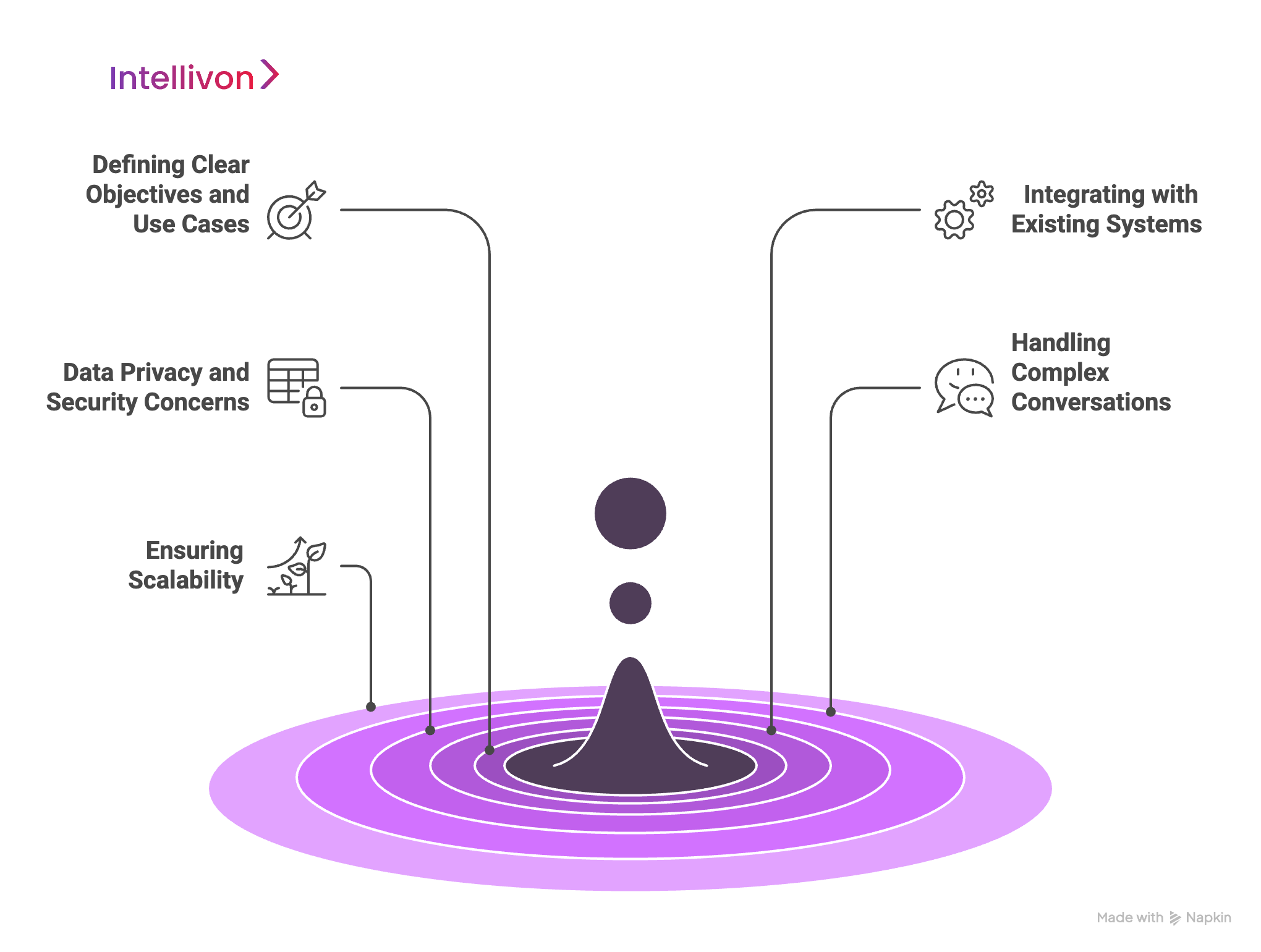
1. Defining Clear Objectives and Use Cases
One of the first hurdles businesses face is clearly defining what they want the chatbot to achieve. Without a well-defined purpose, a chatbot can become a costly tool with limited impact. Common issues include unclear goals, vague use cases, and a lack of alignment with business objectives.
Intellivon Solution:
Before beginning development, we work closely with your team to define clear objectives and use cases that align with your business goals. Whether it’s customer support, sales automation, or internal process improvement, our expert team ensures that your chatbot delivers measurable value from day one. We also collaborate with key stakeholders from various departments to ensure full alignment and understanding across your organization.
2. Integrating with Existing Systems
For large enterprises, a custom AI chatbot needs to integrate smoothly with existing systems like CRM, ERP, billing software, and customer service platforms. Integration can become complex, especially when dealing with legacy systems or disparate software across departments.
Intellivon Solution:
At Intellivon, we specialize in creating AI chatbots that seamlessly integrate with your existing tech stack. Our chatbots are designed with deep integration capabilities, ensuring smooth communication with your CRM, ERP, and other key systems. We use standardized APIs and custom connectors to integrate with your existing software, enabling real-time data exchange and automated workflows that save time and improve operational efficiency.
3. Data Privacy and Security Concerns
Security is a top priority for any enterprise, especially when dealing with sensitive data. With regulations like GDPR and HIPAA, ensuring compliance and protecting user data can pose a significant challenge during chatbot development. Enterprises must be cautious about how their chatbots collect, store, and use data.
Intellivon Solution:
We build enterprise-grade security into every custom AI chatbot we develop. From data encryption to compliance with industry standards like GDPR, HIPAA, and SOC 2, we ensure that your chatbot protects sensitive customer and business data at all times. Our team works closely with your legal and IT departments to ensure the chatbot’s design is fully compliant with relevant laws, and we provide ongoing security audits to keep everything secure.
4. Handling Complex Conversations
While rule-based chatbots can handle simple queries, AI-powered chatbots that use NLP need to handle more complex conversations. Ensuring that the chatbot can understand context, slang, and various customer intents in multi-turn conversations can be difficult, especially with diverse customer bases.
Intellivon Solution:
Our custom chatbots leverage advanced NLP engines that understand the nuances of language, context, and sentiment. By training the chatbot on real-world data, we ensure that it becomes smarter over time, improving its ability to handle complex and multi-turn conversations.
Additionally, our human-in-the-loop mechanism ensures that when the chatbot encounters a query it cannot resolve, it seamlessly escalates the conversation to a live agent with the full chat history.
5. Ensuring Scalability
As your enterprise grows, so should your chatbot. A major concern is whether the chatbot will be able to handle increased traffic, more data, and increasingly complex tasks over time. Chatbots that aren’t scalable can create performance issues, leading to longer response times and unsatisfactory user experiences.
Intellivon Solution:
We design custom chatbots that are built to scale with your business. By using cloud-based infrastructure, we ensure that your chatbot can handle high volumes of interactions and complex processes without compromising on performance. Regular stress testing and performance monitoring ensure that your chatbot remains responsive and efficient, even during peak traffic times or as your business expands.
Conclusion
Choosing the right custom AI chatbot for your enterprise can transform customer service, boost efficiency, and drive growth. While pre-made solutions serve basic needs, custom chatbots offer tailored features, scalability, and seamless integration that evolve with your business.
A well-designed custom chatbot ensures long-term success, enhancing user experience, improving operational efficiency, and providing the flexibility needed to meet the dynamic challenges of large enterprises.
Ready to Transform Your Enterprise with Custom AI Chatbots?
With over 11 years of experience in enterprise AI and 500+ successful deployments across various industries, we are your trusted partner in building secure, scalable, and intelligent AI chatbots. We go beyond generic chatbot solutions, ensuring that your enterprise chatbot is fully integrated, secure, and tailored to meet your unique business needs.
What Sets Us Apart?
Tailored AI Solutions: We design chatbots specifically for your enterprise, ensuring they align with your business processes, goals, and industry requirements.
Seamless Integration: Our chatbots integrate seamlessly with your existing CRM, ERP, and backend systems to ensure a smooth user experience and enhance operational efficiency.
Enterprise-Grade Security: We prioritize your data security with end-to-end encryption, compliance with industry standards like GDPR and HIPAA, and robust data governance to meet your enterprise’s regulatory needs.
Scalability and Flexibility: Whether you’re handling a high volume of customer inquiries or internal processes, our chatbots scale with your business needs, adapting to evolving requirements without sacrificing performance.
Continuous Optimization: We don’t just deploy chatbots—we continuously monitor and optimize them, ensuring they stay up-to-date with your business and technological advancements.
Our Expert Team Will Provide:
- A comprehensive analysis of your AI strategy and goals
- Tailored use cases that align with your enterprise’s needs and ROI
- A deployment roadmap customized for your business environment and tech stack
- Scalable, secure chatbot architecture to support your enterprise growth
- Continuous performance monitoring and updates to optimize outcomes
Book your free strategy call today and start building a chatbot solution that will elevate your enterprise, enhance customer experience, and streamline operations for the future.
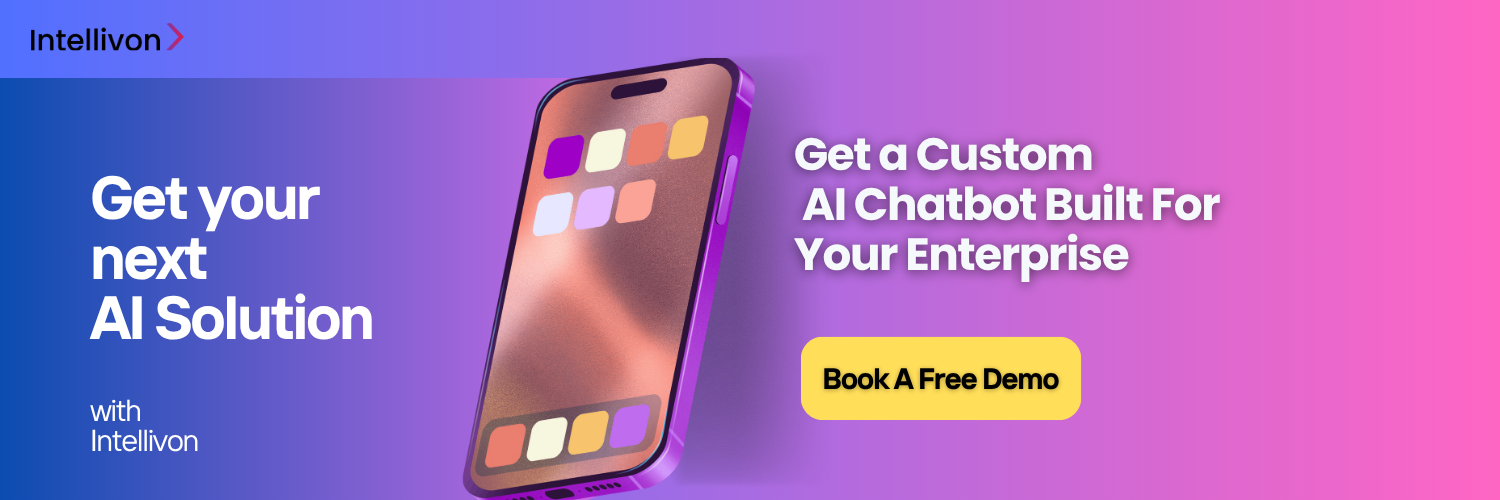
FAQ’s
1. What’s the difference between a rule-based chatbot and an AI-powered chatbot?
A rule-based chatbot follows predefined scripts, responding based on keywords or buttons. It’s great for handling simple tasks, like answering common questions. On the other hand, an AI-powered chatbot uses advanced technology like Natural Language Processing (NLP) to understand and respond to more complex inquiries, providing a more personalized experience. AI chatbots learn from interactions, improving over time.
2. Are pre-built chatbots a good option for large enterprises?
Pre-built chatbots can be a quick, cost-effective solution for smaller-scale tasks or businesses just starting with automation. However, large enterprises often need more customization, integration with other systems, and the ability to handle complex workflows. Pre-built bots might struggle to scale and meet the growing demands of a larger business, making custom AI chatbots a better choice for these companies.
3. How much does it cost to develop a custom AI chatbot?
The cost of developing a custom AI chatbot varies based on factors like complexity, features, and integrations. Simple chatbots with basic functionality may cost less, while more advanced bots with custom workflows, AI capabilities, and seamless system integrations can be more expensive. It’s essential to assess your business needs and desired features before determining the budget.
4. Can a custom AI chatbot integrate with my existing systems?
Yes, one of the main benefits of a custom AI chatbot is its ability to integrate with your existing systems, such as CRM, ERP, payment processors, and more. Custom integrations ensure that your chatbot can access and process data from your current software, making it more efficient and effective in serving your enterprise’s unique needs.
5. How do I know if my enterprise needs a custom or pre-built AI chatbot?
If your enterprise deals with complex processes, handles sensitive data, or requires advanced personalization, a custom AI chatbot is likely the better fit. Custom bots can be designed to meet your specific requirements and scale with your business. If you’re looking for a quick, simple solution for basic tasks like FAQ automation, a pre-built chatbot may suffice. Ultimately, the decision depends on the level of complexity and integration your business requires.

